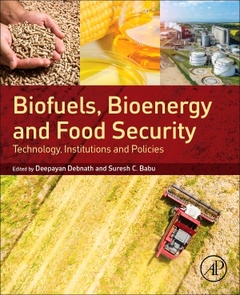Biofuels, Bioenergy and Food Security Technology, Institutions and Policies
Coordonnateurs : Debnath Deepayan, Babu Suresh Chandra

Biofuels, Bioenergy and Food Security: Technology, Institutions and Policies explores the popular ?Food versus Fuel? debates, discussing the complex relationship between the biofuel and agricultural markets. From the importance of bioenergy in the context of climate change, to the potentially positive environmental consequences of growing second generation biofuels crops, this book provides important insights into the impact of policy, the technical implementation and the resulting impact of biofuels. The discussion of existing issues hindering the growth of the cellulosic biofuel industry and their remedies are particularly relevant for policy makers and others associated with the biofuel industry.
Transferring information on bioenergy economy through the discussion of the current and emerging biofuel market, country specific case studies explain the existing biofuel policy and its consequences to both the energy and agricultural markets. Economic simulation models explain the future of the bioenergy markets.
Biofuels, Bioenergy and Food Security: Technology, Institutions and Policies is an invaluable resource to the students, scientific community, policy makers, and investors in the bioenergy industry. Students will benefit from a variety of perspectives on major societal questions in context of the interaction between food security and bioenergy. Its review of existing literature on the biofuel marker, investment opportunities, and energy independence provides a broad overview to allow informed decision making regarding the industry.
I: Introduction to Bioenergy 1. Bioenergy Economy, Development and Food Security 2. Technology, Policy and Institutional Options
II: Technological Options 3. From Biomass to Biofuel 4. Interaction Between Biofuel and Agricultural Market
III: Sector/Market Integration, Contributions, Debates and Challenges 5. Food-Fuel-Fiber Debate 6. Exploring the Potential for Riparian Marginal Lands to Enhance Ecosystem Services and Bioenergy Production 7. Implication of Biofuel Production on Direct and Indirect Land Use Change: Evidence from Brazil 8. Biofuels’ Contribution to Date to Greenhouse Gas Emission Savings
IV: Analyzing Policy Options 9. Consequences of US and EU Biodiesel Policies on Global Food Security 10. The Impact of Key US Biofuel Policies: An LCFS and RFS Example 11. Assessing the Possibility of Price-Induced Yield Improvements to Reduce Land-Use Change Emissions from Ethanol
V: Institutional Challenges and Option 12. Food Security, Biofuels and Sustainability 13. Advanced Biofuels: Supply Chain Management 14. The Role of Biofuels in a 2 Degrees Scenario
Suresh Chandra Babu is a senior fellow and a program leader at the International Food Policy Research Institute (IFPRI) in Washington, D.C and extraordinary professor of agricultural economics at the University of Pretoria, South Africa. Before joining IFPRI as a research fellow in 1992, Dr. Babu was a research economist at Cornell University. He has published 20 books and monographs and more than 100 peer-reviewed journal papers on food and agricultural policies in developing countries. He has conducted research on food and agricultural policy in developing countries for the past 30 years. He has held visiting or honorary professorships at American University, Washington, D.C.; Indira Gandhi National Open University, India; University of Kwazulu-Natal, South Africa; and Zhejiang University, China. He currently serves on the e
- Provides an integrated overview of the world biofuel market by country, including a summary of the existing biofuel policies, role of investment opportunities, and rural development potential
- Discusses the impact of biofuels on efforts by developing countries to become more energy self-sufficient
- Examines the environmental consequences of biomass-based biofuel use.
Date de parution : 06-2019
Ouvrage de 290 p.
19x23.3 cm
Thèmes de Biofuels, Bioenergy and Food Security :
Mots-clés :
biomass; greenhouse gas emissions; biofuel conversion; biofuel trade; feedstock; land management
